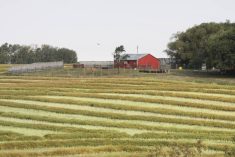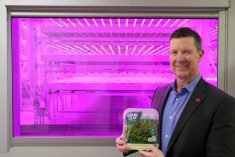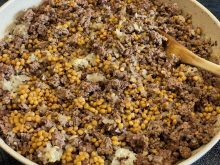TORQUAY, Sask. – Among the tables of baking, vegetables and crafts, Justin Marcotte’s booth at the Estevan Farmers’ Market last summer quickly turned into a favourite.
The 16-year-old entrepreneur established a regular clientele, sold out every week and had money in the bank at summer’s end.
His product was a bit unusual for a teenage boy; he sold bunches of gladioli he grew on the family farm north of Torquay.
The venture was so successful that this spring he doubled the number of bulbs he planted to 2,000. He liked the money and he prefers to create his own job right on the farm.
Read Also

Nutritious pork packed with vitamins, essential minerals
Recipes for pork
Marcotte’s early gardening skills were developed as he and his brother helped an older woman in Torquay with her yard work.
In January 2006 he read an article in the Western Producer about Marg Senkbeil, who grows 3,500 glads on her farm near Kemnay, Man.
He called her for advice and then bought and planted 1,000 bulbs from an Ontario company, Peeters, which specializes in gladioli.
By the third week in July, the plants were flowering and they kept blooming until late fall.
Marcotte isn’t worried about competition or imitators. Growing that many flowers is a lot of work, he discovered.
“Weeding is ridiculous,” he said.
He hilled the rows of plants to keep them standing up straight and prevent them from snapping off in the wind. He also had to dig up the bulbs and store them in the basement over winter.
The flowers are cut at 5 a.m. on sale day so they are as fresh as possible when customers walk into the market.
Most of the Marcotte farm is certified organic, which he also believes gives his glads an edge. He didn’t use any fertilizer or pest control products on his plants.
He ended up supplying flowers to match the décor in the Estevan Days Inn and to a florist. Some of his produce went to local care homes.
And if a bloom wasn’t good enough, he operated on the principle of “sell the best, compost the rest.”
This isn’t the first time Marcotte has created his own income. When he was 12 he bought 50 hens and sold the eggs. This year he wanted to sell blue eggs but couldn’t get the right type of chickens.
He also makes willow chairs from willow trees in the farmyard.
He said it’s about using available resources to make money. His mom, Christa, said he has a “crafty” mind.
Last year Marcotte spent some of his earnings on a Belted Galloway bull and three females. He was intrigued by their heritage and unique characteristics. He wants to raise a herd and although the cattle aren’t certified organic, they are eating organic feed, he said.
Along with the 2,000 glads, Marcotte planted zinnias, sweet peas and vegetables this spring. He hopes to offer baby potatoes and carrots at the market and he’s looking at eggplant, watermelon and cabbage.
He and his mom this year planted an orchard of 650 cherry trees. It will be two or three years before they bear fruit.
The farm used to include a hog barn and at one time the family had 1,000 chickens. Now, with his dad Arnold working for an oil company, Justin and Christa are the farmers. They have a herd of Charolais cattle and grow crops like hemp and faba beans.
They’re also embarking on an asparagus venture with Christa’s parents.
They laugh when they consider what other people say about their activities.
“The neighbours think we’re outside the box,” Justin said.
Christa prefers to think they are innovative. With six quarters of land the operation is too small to grow commodity crops, she said. That was one reason to pursue organic certification, which they obtained in 2003.
Justin, who is in Grade 11 in Estevan, is a member of the Iron Chefs, a group of eight students who produce six-course meals for banquets and fundraisers like the recent hockey banquet that included a visit from National Hockey League commissioner Gary Bettman.

















